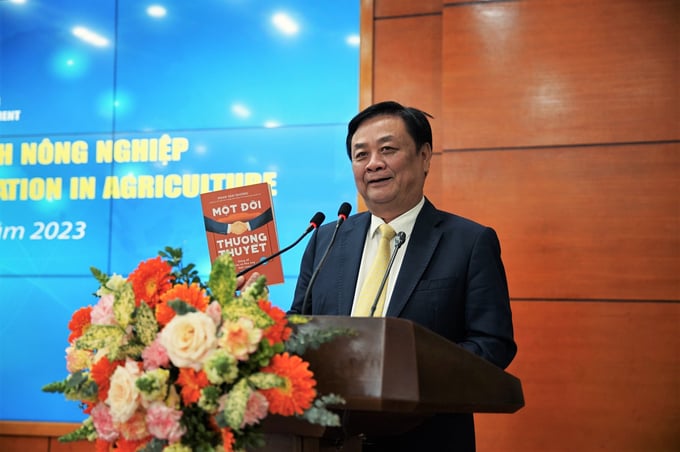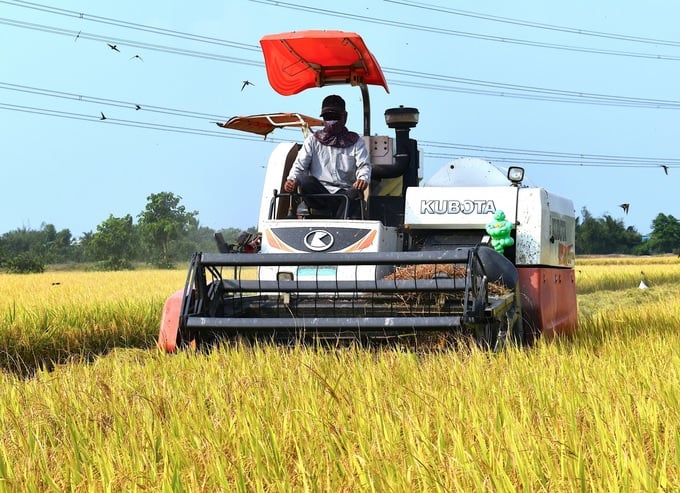November 28, 2025 | 03:35 GMT +7
November 28, 2025 | 03:35 GMT +7
Hotline: 0913.378.918
November 28, 2025 | 03:35 GMT +7
Hotline: 0913.378.918

“International cooperation plays an increasingly important role in the context that globalization and integration become an inevitable trend” - Minister of Agriculture and Rural Development Le Minh Hoan. Photo: Linh Linh.
On February 10, the Ministry of Agriculture and Rural Development (MARD) held a Conference on International Cooperation in Agriculture to share recent results and discuss in order to enhance the effectiveness of international cooperation and international economic integration in the near future.
Speaking at the conference, Minister of Agriculture and Rural Development Le Minh Hoan emphasized the increasingly important role of international cooperation in the context that globalization and integration become an inevitable trend.
Vietnam has joined and is implementing 16 Free Trade Agreements (FTAs), and currently continues to negotiate new Free Trade Agreements with Israel and Canada. This means Vietnam has signed FTAs with all key agro-forestry-fishery (AFF) export markets. This is an important factor to help businesses have a competitive advantage in the world market.
Market opening works have made remarkable progress such as opening the market for durian, sweet potato and bird's nest to China, pomelo to the USA, processed chicken to Japan, pomelo and lemon to New Zealand.
The agricultural sector has also been actively promoting the attraction of foreign direct investment (FDI) and official development aid (ODA), exchanging experiences in construction and technology transfer. This thus contributes to speeding up the process of approaching advanced science, modern economic leadership and management.
“International cooperation always needs to be one step ahead to be ready to deal with all challenges and take advantage of every opportunity with creative methods to effectively serve the policy. of the Party and State, towards the goal of Ecological Agriculture - Vibrant Countryside - Innovative Farmers,” said Minister Le Minh Hoan.
Also at the conference, Mr. Nguyen Do Anh Tuan, Director General of International Cooperation Department, MARD, presented the Draft “Strategy for International Cooperation in Agriculture and Rural Development until 2030”.
The strategy divides into three main groups of tasks and solutions, which include proactively integrating worldwide, bringing into play the best advantages of Vietnam's agricultural sector; strengthening partnerships, building a good image of agriculture, farmers and rural areas in Vietnam; optimizing the mobilization and use of external resources for Vietnam's agriculture and rural development sector.
Regarding implementation, Mr. Nguyen Do Anh Tuan made a number of proposals. Firstly, the agricultural sector needs to promote communication and raise awareness about international cooperation while effectively implementing signed agreements related to the industry.
Secondly, strengthen regular monitoring and evaluation to improve the effectiveness of the implementation of the strategy, and at the same time review and adjust the strategy to suit each period and practical conditions.
Thirdly, develop the Regulation on Foreign Affairs to unify the focal points of international cooperation and management.
Fourthly, improve the quality of human resources, promote innovation; train and appoint qualified civil servants to ensure quality, competence and ethical responsibility; train staff in negotiation skills, legal, market analysis, agro-ecological management; implement the mechanism of recruitment and use of suitable talents.
Fifthly, allocate funds from the state budget, coordinate with international support sources; ensure synchronous and modern equipment for international cooperation agencies in the industry.

Agriculture is an area where Vietnam has a voice and reputation in the world.
Contributing ideas to further develop the orientation of international cooperation in the agricultural sector, Ms. Nguyen Minh Hang, a representative of the Ministry of Foreign Affairs said that the agricultural sector could focus on building a strategy for foreign affairs. “The world is going through a period of profound transformation. In 2023 there will be positive signals with "winds down", China's market opening, consumer trend recovering at a multi-speed, which will create opportunities for Vietnam’s agricultural sector to reach out more strongly to consumers and diversify the markets.”
In recent years, the MARD has actively participated in important international forums, creating the image of a reliable and responsible partner to the international community. Vietnam has been selected by the United Nations to host the Global Food System Forum in April this year. The World Economic Forum has also selected Vietnam as one of the first three countries to pilot the Food Innovation Hub.
Translated by Samuel Pham

(VAN) According to Mr. Vo Minh Thanh, Director of the Tay Ninh Department of Agriculture and Environment, Resolution 57 has created a new development pathway for the locality, shifting from traditional toward modern agriculture.
/2025/11/26/4909-2-154329_878.jpg)
(VAN) Pearl grouper farming in HDPE cages not only delivers economic efficiency but also contributes to protecting the environment, creating jobs, and promoting marine-based experiential tourism.

(VAN) The model of making a living under the forest canopy through the agroforestry system in Van Son commune, Bac Ninh province, is expected to generate an annual income of approximately VND 30 million/ha.

(VAN) Many enterprises in Can Tho are harnessing natural energy and reducing greenhouse gas emissions in their production processes, thereby contributing to the promotion of a sustainable green transition.
/2025/11/24/3536-2-112800_176.jpg)
(VAN) Dong Nai now has tens of thousands of hectares of forests certified for sustainable management, and this area will continue to be expanded in the coming period.

(VAN) Vinh Ha hamlet (Dai Xuyen commune, Hanoi) is shifting away from small-scale farming as households adopt bioscurity into their breeder chicken models.

(VAN) Heavy rains make aquatic species more vulnerable to disease. Proactive water management and high-tech systems help farmers prevent outbreaks and protect yields.